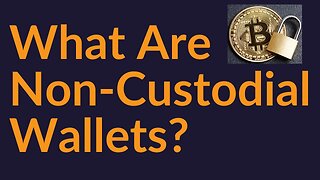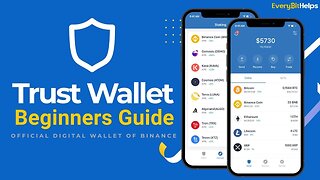Understanding Custodial & Non-Custodial CryptoCurrency Wallets
What is a Custodial and What is a Non-Custodial Wallet?
A custodial wallet is defined as a wallet in which a third party controls the private keys.
This is much like the way your bank account or brokerage account works. You must 'trust' the third party to behave honestly with your funds, since they are transacting on your behalf.
Consider this scenario where you purchase groceries from the supermarket.
You pay with your debit card, but you are only authorizing the bank to send funds from your account to the merchant's account. The bank is the party that is actually moving the funds around. The funds are completely within the bank's control.
A custodial wallet is the type of wallet that you work with when dealing with a broker or a cryptocurrency exchange.
*Please note: Some wallet apps operate as custodial wallets, in that they hold your private keys on their servers, for your 'convenience and safety'.
You will want to minimize your exposure to custodial wallets as much as possible.
Always remember the phrase, "Not your keys, not your coins!"
A non-custodial or self-custodial wallet is a cryptocurrency wallet in which the owner has full control of the Private Keys and therefore full control of the funds. It also implies that the owner has full responsibility for the wallet and its private keys and coins.
In Summary
1) You will be working with both custodial wallets and non-custodial wallets for your cryptocurrency coins.
2) You will want to maintain the majority of your coins in a non-custodial or self-custodial wallet.
3) You will place the coins you wish to trade or sell with the custodial wallet of a broker or cryptocurrency exchange, only for as long as it takes to make the trade or sale. This will reduce your risk of exposure to loss as much as possible.
4) Never trust your coins to a custodial online web wallet or smartphone app!
-
 3:31
3:31
How To Safely & Securely Be Your Own Bank
1 year agoAdvantages & Disadvantages of Using Custodial Wallets
8 -
 3:27
3:27
How To Safely & Securely Be Your Own Bank
1 year agoUnderstanding CryptoCurrency Wallet Types
18 -
 10:23
10:23
99Bitcoins-CryptoCurrency video tutorial
1 year agoHardware Wallets Explained, Reviewed and Compared
23 -
 9:43
9:43
Bitcoin University
2 years agoNon-Custodial Wallet (What Does It Really Mean?)
5 -
 17:42
17:42
IT'S TIME FOR CRYPTOCURRENCE
1 year agoTrust Wallet Review & Tutorial 2023: Beginner's Guide on How to Use Trust Wallet
21 -
 6:39
6:39
decentralisednews
2 years agoTop 5 Non-Custodial Cryptocurrency Wallets
19 -
 8:00
8:00
Coinmarketcapofficial
1 year agoWhat's a Crypto Wallet? Crypto Wallets for Beginners 2022
10 -
 3:28
3:28
decentralisednews
2 years agoNon-custodial Crypto Wallets (Explained Simply)
1 -
 13:14
13:14
99Bitcoins-CryptoCurrency video tutorial
1 year agoWhat is a Bitcoin Wallet?
39 -
 27:49
27:49
DerekonChain
1 year agoLACE UP & Get Going: Review of The GREATEST Crypto Wallet - Don't Wait!
17